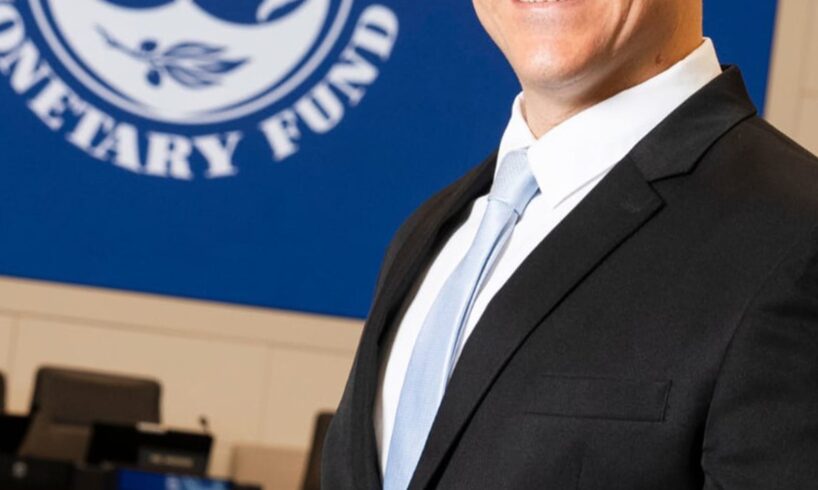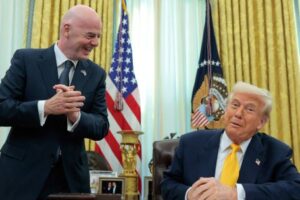
The 50% tariff imposed by the United States on Brazilian products is expected to have only a marginal impact on Brazil’s economic growth. That is the preliminary assessment of the International Monetary Fund (IMF), which is still calculating the full effect of President Donald Trump’s decision.
“This is a decimal-level impact; we’re not talking about 1% or 2% of GDP. It’s much smaller than that,” said André Roncaglia, Brazil’s executive director at the IMF, in an exclusive interview with Valor. He added that the trade war presents Brazil with an opportunity to absorb such shocks through new trade agreements and the finalization of the Mercosur–European Union agreement.
On Thursday (17), the IMF maintained its 2025 GDP growth forecast for Brazil at 2.3%. For 2026, the projection is 2.1%. The figures were published in the Fund’s annual report on the Brazilian economy, based on regular consultations with local authorities. They reflect a moderation compared to the growth seen in 2023 and 2024 and account only for the Trump tariffs announced in April.
The IMF also projects that inflation will reach 5.2% by the end of 2025 and gradually converge toward the 3% target by the end of 2027. Mr. Roncaglia noted that the balance of risks is tilted positively for inflation reduction but warned that without fiscal consolidation, the Central Bank may delay cutting the Selic policy interest rate.
He also stated that the IMF forecasts Brazil will need a fiscal effort equivalent to nearly 2% of GDP to stabilize the debt-to-GDP ratio, which is projected to peak at 99% in 2029. That task, he stressed, will require cooperation from all branches of government. “This is not just a job for the federal Executive, but for all authorities,” he pointed out.
Below are the main excerpts from the interview:
The report only included scenarios up to April 2. The Fund’s team is already working to assess the impact of last week’s announcement (the 50% U.S. tariff on Brazilian goods). According to preliminary estimates from the Fund’s research department, any effect on Brazil’s economy this year would be minimal, at most marginal. Next year, the impact may be slightly larger, but it will not be alarming. Brazil’s economy has limited dependence on the United States; U.S. trade accounts for a small share of our GDP. So the effect of a 50% tariff on our economy will be small, just decimal points, not anything close to 1% or 2% of GDP.
Brazil has the opportunity to weather these shocks by opening new trade fronts, fast-tracking the conclusion of the agreement with the European Union, and expanding its presence in the Latin American regional market, which holds significant potential for productivity gains and improved trade. But of course, the tariff hike raises concerns due to the uncertainty surrounding these announcements. We don’t know if they will be enforced. And uncertainty tends to stall investment projects. That’s why the Brazilian government must send clear signals that it will protect the economy, the industrial sector, and the industries most affected by these measures.
It’s not easy to estimate the global economic impact without knowing how other countries will respond. So far, based on Trump’s announcements alone, the projection is for slower global growth coupled with rising inflation. The key issue is how that impact will be distributed—which countries will see more inflation, which will experience slower growth. But I believe uncertainty is inherently detrimental to developing countries, which are more vulnerable to exchange rate volatility. On the bright side, Brazil is not only more shielded from these shocks but also experiencing strong growth, with a robust labor market and a powerful green transition agenda.
For Brazil, there will be some effect, but it will likely come through the exchange rate. Interestingly, the effect has been the opposite of what one might expect. Typically, uncertainty would lead to a loss of confidence in the real and capital flight. However, the Central Bank’s firm stance on meeting its inflation target has sent a strong signal that it will not let inflation spiral out of control. At the same time, it is also being cautious not to suppress Brazil’s main growth drivers. Note that even with interest rates at 15%, Brazil’s economy continues to expand robustly. There is some deceleration projected for 2025, but as exchange rate pressures ease and food inflation begins to subside, the monetary authority will have more room to reduce interest rates.
The IMF sees a set of conditions that must be met before interest rates can begin to fall. These include improvements in global uncertainty and progress on the fiscal agenda. In the Fund’s view, if there is no resolution on the fiscal front, interest rate cuts will be postponed.
The IMF recommends a stronger fiscal adjustment than what the government has proposed. According to the Fund, the primary surplus needed to stabilize the debt is 1.7% of GDP. This would require a fiscal effort of approximately 2% of GDP from the Executive Branch. As we’ve seen, it has been very difficult to resolve Brazil’s fiscal issues. The intensity of distributive conflict is high, and that’s reflected in the budget debate. The Fund urges all branches of government to reach a consensus to ensure the sustainability of the fiscal framework.
There is also a crucial but quieter agenda focused on economic growth. The government has been pushing a strong set of microeconomic reforms that will yield long-term benefits. One key area is financing the green transition, which, when it takes effect, will have very positive consequences for our trade balance and productivity.
The IMF holds the widely accepted view in the economic literature that a fiscal adjustment involving both revenue and spending is more likely to gain social acceptance and political approval. The challenge lies in sequencing these reforms based on what is politically feasible at each stage.
The IMF is not only addressing the federal Executive Branch. It is calling on all branches of power—Congress, the Judiciary—to participate. If the Executive acts alone and there is no cooperation from the other powers, it leads to greater conflict and rising uncertainty. The Fund’s message is clear: Brazilian authorities must act responsibly and vigilantly to safeguard the country’s fiscal stability. That said, Brazil retains full sovereignty over how, when, and through what means it pursues its fiscal adjustment.
The Fund considers the package positive overall. However, if we look specifically at the IR exemption up to R$5,000, the IMF sees that as a regressive measure, since it benefits individuals with above-average income. That’s why taxing the top income brackets is crucial, not only to ensure revenue neutrality but also to redistribute the tax burden more fairly. The compensation measures within the broader package are essential.
Since 2019, the IOF on foreign exchange has been gradually reduced. In 2022, it stood at 6.38%, and the government has been phasing it out. In 2024, it was cut from 4.38% to 3.38%, and the latest move adjusted it slightly upward to 3.5%. What remains uncertain is when fiscal and regulatory conditions will allow the government to continue with the planned elimination of the tax. For now, the downward path is intact, and we’ll have to wait and see whether the government intends to proceed with full elimination.
The Fund sees the indexation of pensions to the minimum wage and the earmarking of health and education spending to government revenue as factors that could put excessive pressure on spending. The Fund believes some progress is needed in this area, but acknowledges the political difficulty involved.
The IMF’s executive board believes the fiscal framework needs to be strengthened. The aim is to move forward with necessary reforms, provided that they are fairly distributed, to channel public resources to where they are most needed: health, education, and both social and physical infrastructure.
(Marcelo Osakabe contributed reporting, from São Paulo)





